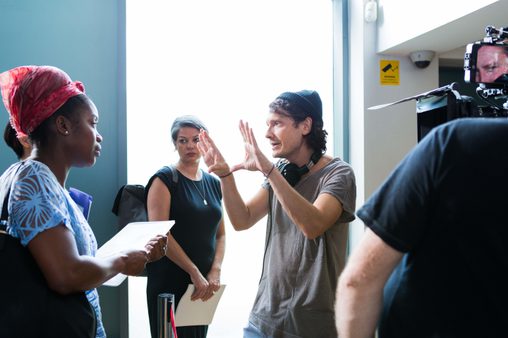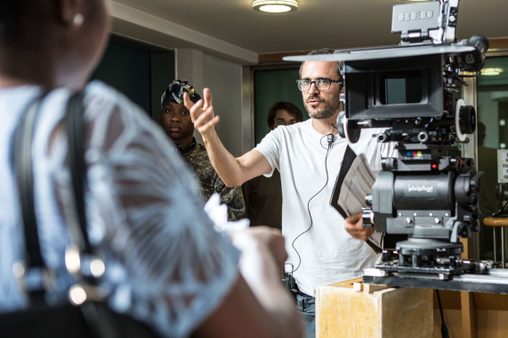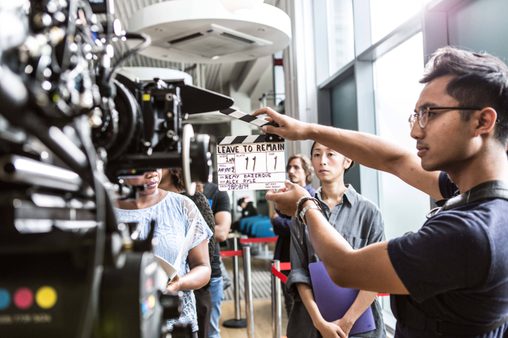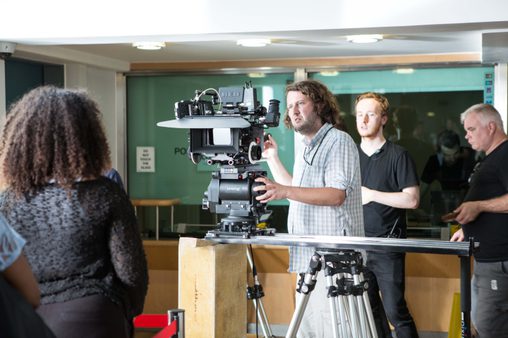News Story
Leave to Remain is a political comedy where a normal day at the VISA and immigration services takes a wild turn. Supported by the BFI NETWORK Short Film Fund, it screened at the BFI London Film Festival 2021 as part of the LFF for Free: London Calling series. It also had selections at festivals worldwide including Dublin International Shorts Film Festival and Oslo Film Festival. We caught up with the team behind Leave to Remain - director & writer Remy Bazerque and producer Tibo Travers.
You can follow Remy Bazerque on Instagram - @remy_bazerque, and at www.remybazerque.net.
You can follow Tibo Travers on instagram - @sweetdohfilms, and at www.sweetdoh.com.
What was your journey into the film industry like?
Remy Bazerque: I started as an actor in France, mainly in theatre. I did my first short film with friends from drama school and then realised that I preferred being behind the camera. I decided to go to film school and set my sights on NFTS after seeing Stephen Frears shooting Cherie in the streets of Paris - it was like a big Hollywood film and made a strong impression on me. And when I was looking for film schools, I saw he was a tutor there, and it felt like a sign.
I came to London from France, worked hard in an East London pub, and was lucky enough to get picked into the NFTS directing course. There, I made several shorts and met terrific people I still work with to this day. The journey has taken me from Cannes to the most indie film festival imaginable, from the highest joys to disappointment sometimes, but always learning more about myself in the process.
Tibo Travers: I started making short films as a teenager, but never really anticipated I would ever make a career out of it. When I finished my BA (in Business!) I decided to move into films and did an MA in Film and TV Production to get some formal training. That same year I also started working as a runner on short films and promos, and pretty much made my way up from there to working as a 1st AD on low budget features and on commercials for a few years. Meeting a lot of like-minded writers and directors made me want to create my own work, and with that in mind, I started my production company Sweetdoh Films and began producing my own work, which was a huge source of satisfaction. I’m now at a stage where I freelance produce for TV Production companies, while still developing and producing my own films, including my first feature, which is currently in development with the Ffilm Cymru Wales and the BFI.
Tell us more about your short and the inspiration behind it.
Remy: I tend to use my work to exorcise personal, intense emotions. It's an inside out process for me. That's actually how I usually decide if a project is worth fighting for - do I have that irrational emotional connection with it? In the case of our short film Leave to Remain, I was pretty frustrated and angry because of Brexit. Not necessarily because of my specific situation, but it also coincided with the Windrush scandal and a general toxic atmosphere in the UK for foreigners.
It was building and building, and one day I just sat down and wrote this. It was fueled by anger and my need to let it out. I wanted to make an angry film, but also I wanted to laugh about myself and exorcise all this through comedy.

Director Remy Bazerque (Photo: Yannick Lalardy)

Producer Tibo Travers (Photo: Yannick Lalardy)
I hope the film reaches as broad an audience as it possibly can and speaks to people who struggled with immigration issues. I also hope it will allow people who didn't experience these things to empathise more and rehumanise the debate around immigration.Remy Bazerque, Director (Leave to Remain)
What was your creative process, how did you prepare to make the film?
Remy: After letting out the script more or less in one go, I let it rest for a while to forget about it and see if I’d still feel as strongly about it later, which I did. Then we decided to apply for funding with BFI NETWORK. After we got picked, we went through the process, with workshops and feedback sessions, which I have to say were very helpful. Film London folks care about progressing the filmmakers as much as they care about the films themselves, so it was how the script got better really, by going through the gauntlet with our Film London producers.
Tibo: As a producer, prepping a short film is all about keeping an open mind, being flexible and ready to adapt your plans, and knowing how to think creatively to overcome the obstacles that will inevitably come your way. Creatively, I find it crucial to allow enough soft prep time to really work the idea with the writer/director, because once you get close to the shoot, the adrenaline kicks in and I find it much harder to be creatively dynamic. Remy and I managed to go away together for a week during the summer before our shoot. Having all that time together really benefited our creative process, and put me in a much stronger place to prepare the appropriate logistics for the shoot when we came back.
Leave to Remain is a brilliantly comedic short film that also highlights the current state of UK immigration and social issues. Why do you feel stories like this are important and how does humour help get a point across?
Remy: Thanks, I'm glad you liked the film. When Brexit happened, it opened up a Pandora’s Box of sorts and the atmosphere in the UK degraded quickly. Immigration became such a polarising issue. I guess somewhat selfishly, I didn't start caring as much as I do now until I felt threatened myself. That's sort of the film's point - trying to get the audience to imagine how they’d feel if this happened to them. I felt guilty that I maybe didn't care as much until I was personally affected. So in a sense, that's my way of expressing that.
As for the comedy, I think it helps to get messages across in a non-sanctimonious way. I think it's always a challenge to find the right balance between humour and seriousness, especially for serious questions like this. Still, my favourite films mix these things up successfully, so that has always been my aim.
Tibo: Laughter is such a powerful tool when it comes to bringing an audience’s guard down, and taking them to a place where they can think holistically about issues as “serious” as immigration. Nothing quite brings people together as much as their ability to laugh at an inherently funny situation, despite the desperate context surrounding it. And I’m a firm believer that audiences need/want more comedies about important social issues.
How did you come to form a collaborative team for this project?
Remy: Tibo and I are long-time friends. We have done several shorts together in the past already and always have something in development together. I’m also friends with Alex Ryle, our DOP, who I know from way back, so it’s a tight group of people who are used to working together.
Tibo: Filmmaking is first and foremost a collaborative effort, and as such it relies on a relationship of mutual trust, which is a crucial element for a producer to rely on. The team we brought together for Leave to Remain was largely made of friends and regular colleagues who deeply cared for the film and the message behind it.

Shooting Leave to Remain (Photo: Yannick Lalardy)

DOP Alex Ryle (Photo: Yannick Lalardy)
Do you have any favourite moments from the shoot?
Remy: I have two. The first one is the final scene. We had a lot of 'extras' although I don't like that word. People who agreed to join the team to be our crowd of harrowed immigrants at the home office. But they still had to do something pretty extreme at the end of the film - I'm trying not to spoil the ending here!
I was pretty amazed at how generous and madly intense everyone went for that bit. I'm still grateful at how this group of people who didn't know each other in the morning and had barely twenty minutes to rehearse did that scene.
The other moment, it’s more several moments. You wouldn't believe how many people came to me individually, either by email or on the shoot, to talk about their own Home Office/immigration horror stories and how the film resonated with them specifically. It made me feel that we were doing something right.
Tibo: Unleashing a crowd of extras and allowing them to wildly release their inner “animal” for our camera was a moment I’ll always remember as being both terrifying and hilarious.
What's the best thing you did (or thing you wish you did) on the first day of shooting?
Remy: I wish I had sat down and rehearsed properly with the actors. It's very hard on indie projects to do this, and I always crave that moment to build the performance more intimately. But it's difficult with time and budget, and here we had challenging shooting days.
Tibo: Turning up on set early. Which we did!
Leave to Remain had a screening at London Film Festival 2021, as part of the London Calling at LFF for Free series. How was the experience? What are your hopes for the film post-LFF?
Remy: I'm grateful for the opportunity to screen the film amongst works from such a talented bunch. It also felt great to finally see the movie hit an audience and how the comedy impacts them. As for the future, I hope the film reaches as broad an audience as it possibly can and speaks to people who struggled with immigration issues. I also hope it will allow people who didn't experience these things to empathise more and rehumanise the debate around immigration.
Tibo: It was our dream to have our film premiere as part of the London Film Festival, and the experience really lived up to our expectations. Having two screenings in a packed room was a real honour, as was the chance to witness an audience crack up at our silly jokes. You’re never quite sure a comedy works until you hear those laughs, and that first screening is always a very special moment of pride, and relief! Post LFF, I hope to show our film to as wide an audience as possible, both in festivals and later online. And if we can snatch a couple of awards along the way, I wouldn’t mind!
What are you currently working on, and how are you navigating the Covid situation and keeping engaged and balanced?
Remy: I'm doing tons of writing at the moment. I am developing a comedy script set in and around the world of football and football agents. I haven’t decided yet whether it's a first feature or more of a TV format. I am also writing animated cartoons for an ed-tech company called Novakid, which is good fun. On the side, I'm also writing my first novel. That looks like a lot of writing rereading the previous sentences! I guess Covid got me to write even more than usual. I'm always looking into what matters to me, trying to find the next story that will resonate, what I want to talk about, trying to progress as a human being in the process. That's what matters to me.
Tibo: I’m currently working on a new short film shot in October 2021 and developing my first feature with the BFI, a coming of age sci-fi set in Wales called Out There.
What advice would you give to filmmakers embarking on making their short film right now?
Remy: Be honest with yourself and your idea. You need to have that emotional connection with what you are working on. Make sure it's there, cherish it, protect it. Don't worry about trends and results. Just don't forget that we are there to create something meaningful - it's not all about success, numbers, achievements. Someone wise at Film London once said, “where you end up doesn't only depend on you”, and I think that's very true (I think it was Angeli Macfarlane - sorry if it was someone else!)
Just make sure that you do something that makes you feel alive as an artist in the process. That's all that matters in the end.
Tibo: Be fearless, be involved... and be patient.

